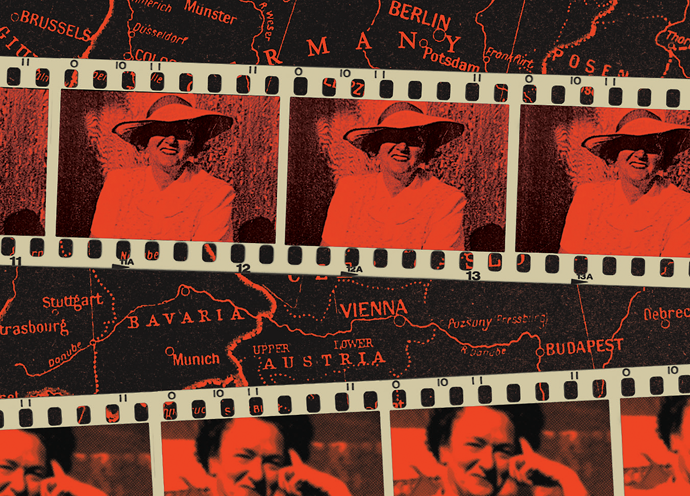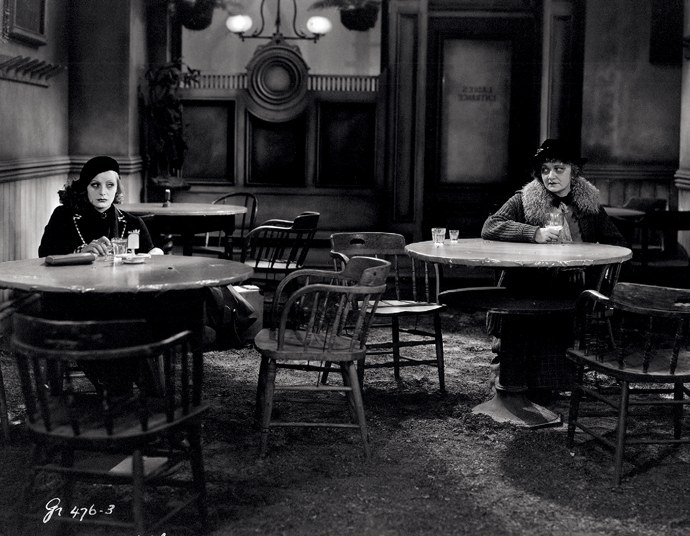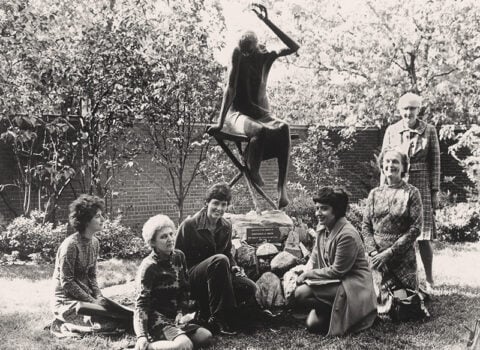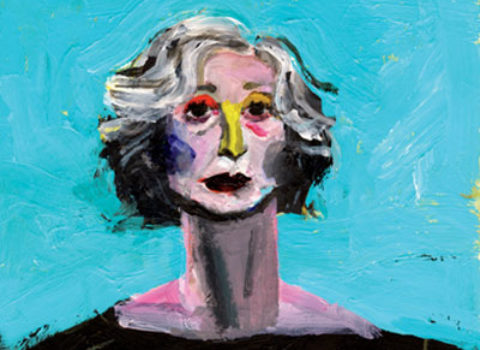Discussed in this essay:
The Kindness of Strangers, by Salka Viertel. New York Review Books.
368 pages. $17.95.
The Sun and Her Stars: Salka Viertel and Hitler’s Exiles in the Golden Age of Hollywood, by Donna Rifkind. Other Press. 352 pages. $28.99.

Illustration by Joan Wong. Source images: photographs of Salka Viertel © Private Collection; filmstrip © imageBROKER/Alamy; map of the German Empire © World History Archive/Alamy
In May 1941, Thomas and Heinrich Mann, along with several dozen other members of the European intelligentsia in exile, gathered in a Santa Monica living room for a belated celebration of Heinrich’s seventieth birthday. As Nazism consumed their native Germany, the brothers had fled to Hollywood, where, during the war years, an astoundingly distinguished group of European artists and intellectuals found refuge and employment. In a speech he delivered that night—nominally a birthday toast to his brother—Thomas Mann denounced what had become of Germany’s great humanist tradition, suggesting that even Goethe and Nietzsche, were they still alive, would have joined the émigrés in America rather than suffer the depredations of the Third Reich. “When the homeland becomes foreign,” he concluded, “the foreign becomes the homeland.”
The host of the birthday gathering, Salka Viertel, was the living embodiment of that idea. A former stage actress who had the luck and the prescience to get out of Europe in the late 1920s, she reinvented herself in America as a screenwriter and created a replica of a Continental salon in her beachside home: “Arpège and cigar smoke, a tumult of piano chords, the confidential lilt of German, and, through the open terrace doors, the ionized breath of the sea,” in the description of Donna Rifkind, a book critic and the author of The Sun and Her Stars, the first English-language biography of Viertel. The house quickly became a headquarters for the luminaries of Hollywood’s “German colony.” “You might find yourself sharing brilliant conversation or a Sachertorte with [Bertolt] Brecht,” recalled the producer and actor John Houseman (born Jacques Haussmann in Romania). There, Greta Garbo discussed how to play Hamlet with producer Max Reinhardt; Charlie Chaplin discovered his musical ghostwriter; and Arnold Schoenberg made small talk with Arthur Rubinstein.
At first, Salka—as Rifkind always refers to her—primarily played the role of social connector, helping new émigrés create friendships and find employment opportunities. As the political situation grew more dire, she used her wide-ranging list of contacts to help secure visas and affidavits for friends, family members, and strangers seeking a lifeline out of Europe. Once scolded by her childhood governess for being too extroverted, Salka put that very quality to work in saving countless lives.
Salka chronicled her fascinating life in The Kindness of Strangers, a stylishly written, stirring memoir originally published in 1969, when she was seventy-nine, and recently restored to print. Now complementing it is The Sun and Her Stars, in which Rifkind makes a passionate case for rescuing her subject from anonymity. The refugees—“a group of traumatized artists who were lucky enough to escape Hitler’s death trains and extermination camps”—were “Hitler’s gift to America . . . prodigious individuals who enriched the film culture and the intellectual life of our nation, and whose influence continues to resonate,” Rifkind writes. The story of their contributions to Hollywood’s golden age has been told. But, as Rifkind argues, the accomplishments of those who worked behind the scenes—many of whom were women—have been unjustly forgotten.
Rifkind focuses her book on Salka Viertel’s years in Hollywood, skipping her subject’s early life almost entirely. It’s a defensible choice—many biographers chafe at the de rigueur recitation of grade-school accomplishments. Still, knowing where a person comes from, especially an exile, is important. As she writes in her memoir, Salka—born Salomea Steuermann; she used her nickname almost exclusively—grew up happily on an estate called Wychylowka, just outside the town of Sambor, in what was then Polish Galicia and is now Ukraine. She, her sister, and their two brothers spent summer days swimming in the Dniester River or collecting mushrooms and berries; in the evening, the family gathered around the piano to sing Mozart, Verdi, or Schubert. Her father was the town’s first Jewish mayor; from her mother, Auguste, the young Salka learned the importance of hospitality. The house had two kitchens, one featuring a French chef, the other kept strictly kosher for observant guests.
Like many assimilated European families, the Steuermanns were only nominally Jewish—though even so, Salka’s father would express disapproval when her first suitor proposed on Yom Kippur. They celebrated Christmas twice each year: once as a family, then again two weeks later with their Ukrainian servants. But Salka was fascinated by an Orthodox family in the village and would peer in the windows as they lit their Sabbath candles. “I knew that we were Jewish,” she wrote in her memoir,
but we certainly did not belong to those strange people in long black kaftans, with beards and sidelocks, and we did not understand their harsh idiom. Still, we were not Christians either.
Even as a child, she lived between two worlds.
Salka’s parents brought their theater-obsessed teenage daughter to visit a famous director, hoping he would discourage her. “The girl has talent,” he pronounced instead. She spent the early years of her career bouncing from one company to another in Zurich, Berlin, Vienna. In Berlin, she and her brother Edward, a pianist whom Schoenberg had tapped as his designated interpreter, created their “own small Wychylowka” in a two-room apartment. Every morning, a new page from Schoenberg’s opera Pierrot Lunaire would arrive in the mail, and Edward would immediately sit down to practice it. The first performance was greeted with boos and hisses, but his admiration for the composer did not diminish. Salka would remember Schoenberg’s “huge, dark, burning eyes, the eyes of a genius.”
Salka was vacationing with her family in Zakopane, a Polish mountain resort, when the Archduke Franz Ferdinand was shot. By the time they got home, Wychylowka had become an army headquarters and was filled with soldiers. She and her sister volunteered as nurse’s aides at the hospital up the road:
What we desperately wanted to convey to those dazed, maimed men, was that we were personally concerned, and we tried to draw them out from the horrible anonymity into which they had been thrown.
Meanwhile, the railway station in Sambor filled with trains from the east, “crowded with starved, parched, ill-smelling people, mostly Jews . . . with memories of pogroms still in their bones.” The Steuermanns fled ahead of the Russian advance, rolling up their precious Persian rugs for safekeeping in the vaults of the local Catholic church. The train journey to the Carpathians, usually two hours, took six days. It was Salka’s first taste of refugee life.
By the time she returned home, the following summer, the house had been looted; even the rugs in the church had been eaten by rats. The Germans were running a P.O.W. camp next door. They invited the Steuermann women to join them in their bowling alley, but “the presence of the two skeletons [P.O.W.s] putting up the pins prevented us from appreciating our hosts’ humor and indubitable politeness,” she wrote. Back in Vienna, an acquaintance introduced her to Berthold Viertel, a young director who listened with interest to her stories about her hometown. “You know that I am going to marry you?” he asked at the end of the night.
The Viertels spent the next decade moving from one set of furnished rooms to another, following job opportunities from Prague to Zurich to Dresden and back again. Their financial condition was so precarious that Salka often feared to remove the dust covers from their borrowed furniture. Nonetheless, they seem to have encountered all the greatest artists of the era. Rifkind laments in her biography that researchers have mined Salka’s book for anecdotes about her more famous acquaintances while ignoring the memoirist herself, but it’s easy to see why—the anecdotes are wonderful. In Prague, the Viertels dined occasionally with Max Brod and Franz Kafka, but Salka was “too awed and too shy” to speak to the great writer. Later, when Berthold was working in Dresden (she commuted via overnight train from Munich to visit him), they had tea with Rilke and lunch with Oskar Kokoschka:
Entering his studio I noticed a blond woman reclining on the couch, which in my short-sightedness I believed to be another guest, but which was a life-sized doll, the replica of a lady he had been in love with. . . . We ignored her presence.
Meeting Brecht for the first time in Berlin, she writes: “He could have been painted on a silk scroll as an Oriental sage, had it not been for his eternal leather coat and cap, which made him seem dressed for an automobile race.”
The life of a working actress was especially difficult in those politically unsettled, economically unstable years. After the birth of Hans, her first child, Salka went back to performing almost immediately, nursing the baby in her dressing room. (One of the parts she played, a longtime role, was Medea.) She had no money for baby clothes, but a fan who heard about her pregnancy sent a layette, a gesture that moved her to tears. After the arrival of her second son, Peter, Salka returned to work “after six weeks of exercise and dieting.” She took jobs in Hamburg, Leipzig, and wherever else they were offered, while Berthold directed in Dresden and the children spent much of their time with a nanny. Meanwhile, the conditions around the family deteriorated. Returning to Germany with the children after a summer in Wychylowka, Salka had to buy new train tickets at each transfer point, the prices changing constantly with inflation. In Krakow, she spent all her Polish zloty on milk for the children; at the Czech border, as the customs officer poked through her bag of dirty diapers, she learned that her devalued currency was insufficient to get her even as far as Prague. A theatergoer recognized her and bought her a third-class ticket to Dresden, where she left the children with Berthold before continuing on to the job that awaited her in Hamburg. A peasant family on the train offered the children thick slices of bread slathered with raspberry jam, but pride prevented her from asking for one for herself.
In the summer of 1928, at Wychylowka again with the children—who now included a third son, Tommy—Salka received a cable from Berthold telling her he had been offered a job in the United States. “They say Hollywood is a paradise! We will have a bungalow,” he wrote. The couple’s recent years had been marked by the failure of an experimental theater troupe they had founded together in Berlin; later, Salka had come down with a near-fatal case of pneumonia. It is no surprise they were both ready to leave a disintegrating Europe. Still, Salka regretted giving up an offer from a theater company in Berlin; she must have suspected that moving to Hollywood meant that she would never work in theater again. But she could not let her own desires get in the way of her husband’s ambition.

Greta Garbo (left) and Salka Viertel (right) in Anna Christie, 1930 © MGM/Photofest
“Why don’t you write?” Garbo suggested to Salka. The two women had met at a party not long after Salka’s arrival in Hollywood, striking up a lifelong friendship. “I am not a writer,” Salka replied. “I am an actress, temporarily unemployed.” She managed to get cast in a few small film roles, including opposite Garbo as the prostitute Marthy in the German-language version of Anna Christie. But—at age thirty-nine when she emigrated—she soon realized she was “neither beautiful nor young enough” for film. And after working in the theater, she was frustrated by the pace: “Acting in fragments is like drinking from an eyedropper.”
Salka was a writer, as her memoir makes beautifully clear. Here is her first impression of California, inflected by her European perspective but instantly recognizable:
We found Los Angeles cold and overcast, with the sun, against which we had been so emphatically warned, invisible. While we were driving along Sunset Boulevard I noticed that there were no sidewalks in front of the uniform, clapboard houses and bungalows. An extraordinary fantasy was displayed in roof styling: some roofs were like mushrooms, many imitated Irish thatch and the shape of others was inspired by Hansel and Gretel’s gingerbread house. Ice cream was sold in the gaping mouth of a huge frog, or inside a rabbit; a restaurant was called “The Brown Derby” and looked like one. The buses we passed offered service with a smile . . .
But she would soon chafe at the frustrations of life in Hollywood. After she spent months working on a treatment for a film about Queen Christina of Sweden—a vehicle for Garbo—the producer Irving Thalberg insulted her with a lowball offer, which she defiantly rejected. They eventually agreed on a number, and Salka was proud of the final product, but the film was not commercially successful. A story about Napoleon’s affair with Marie Walewska, another potential role for Garbo, spurred the studio to send Salka on a research trip to France, allowing her to reunite briefly with her mother, her sister, and Edward, in Switzerland. Though anti-Semitism in Poland was on the rise, Jews continued to be accepted in cultural life; Edward was still able to perform, even if his students were beginning to leave Vienna. At a dinner party in Paris, the person seated next to Salka remarked, “I don’t see any reason why one should not work in Germany. The Jewish question concerns only the Jews.” She got up and left.
In August 1939, now naturalized as an American citizen, Salka was in Europe again—this time laying the groundwork for a biopic about Marie Curie. Just two days before she intended to meet her mother in Warsaw, the Non-Aggression Pact was announced:
My telephone kept ringing; people had heard that I was in Paris and desperate voices besieged me for help. I had heartbreaking visits from total strangers and I promised everyone to do whatever I could to get them affidavits.
The problem was the American quota system for immigration, which, as Rifkind writes, “was designed to accept more ‘racially desirable’ people from northern Europe … and fewer undesirable emigrants,” and which actually inspired, in part, Nazi policies. (The Nazis were also impressed by our Jim Crow laws, although they found the “one drop” standard too high.) After Kristallnacht, the U.S. Consulate in Berlin alone received 160,000 applications for visas, but 77 percent of Americans opposed increasing the quotas. The official government position toward the refugees was “sympathy without hospitality.”
Salka offered sympathy with hospitality. Liesl Frank and Charlotte Dieterle, two other émigrés in Hollywood’s German community, had established the European Film Fund, which asked all Europeans employed by studios to donate 1 percent of their salaries to refugee relief. (Among those who complied were the Casablanca cast and crew, which was made up almost entirely of émigrés.) Together with them and others, Salka marshaled her powerful friends to offer affidavits guaranteeing financial support to new emigrants; among those who contributed were Dorothy Parker and Herman Mankiewicz. Sometimes the matches she made were fateful. The director James Whale had heard the music of Franz Waxman, a Jewish composer from Germany, and wanted to commission him to write a score for The Bride of Frankenstein, but didn’t know how to contact him until the two men encountered each other at Salka’s salon. After that commission launched Waxman on a successful career, he used his newfound wealth to provide affidavits for just about anyone who asked, including an entire family in Vienna who shared his last name but to whom he was not related. “Their school-age daughter had written to him out of the blue after seeing his name on the credits at the cinema,” Rifkind reports. “He saved them all.”
Meanwhile, Salka cabled ever-increasing sums to “unknown people with Jewish names” on behalf of her mother, who was now at the mercy of the Soviets occupying eastern Poland. Garbo, too, pleaded with the U.S. ambassador to Moscow, whom she had met in Sweden, to expedite Auguste Steuermann’s visa. In September 1941, as the Nazis advanced eastward, Salka’s mother was finally allowed to board a ship for the United States. It is only too clear what happened to all the people who could not take advantage of such well-placed connections, including Salka’s younger brother, Dusko, whom she was unable to get out of Poland. When Salka confided to Brecht about her survivor’s guilt, he wrote a poem for her about it that began: “I know, of course, that only through luck / Have I outlived so many friends.”
Hollywood, in the words of screenwriter S. N. Behrman, was “as crowded with artists as Renaissance Florence. . . . It had never happened before. It will never happen again.” Rifkind argues strenuously for Salka’s significance in shaping the motion-picture industry, noting that
the aspirations and concerns of émigré filmmakers such as Salka—themes of isolation and belonging, of home and away—were now so fused into the language of Hollywood pictures as to be indistinguishable from it.
But it’s a stretch to call Salka a filmmaker: she seems to have been mainly a screenwriter and consultant, although it’s hard to tell, since some of her work was uncredited. Her ultimate gift was in creating links between people, although even she could not always bridge the chasm between brash Hollywood and genteel Central Europe. Rifkind cites her skill as a “cultural broker” at a meeting between Thalberg and Schoenberg—the producer, preposterously, wanted the avant-garde composer to provide music for one of his films—and scorns those who have credited Salka only with introducing the two men, calling her “a destroyer of walls, a builder of bridges, a welcome among strangers.” But here Salka was unsuccessful: Schoenberg, a consummate artist, insisted on complete control of all the sound in the film, including the actors’ diction, and naturally Thalberg declined. Nothing, not even Salka’s emotional intelligence, could have made Schoenberg a composer of movie music. Still, she told the story of the encounter unforgettably, describing Schoenberg as so anxious about forgetting his umbrella that he clutched it throughout the meeting. (Things didn’t go much better when Brecht decided he wanted to write a “commercial” screen treatment with Salka as his coauthor: “What the producers want is an original but familiar, unusual but popular, moralistic but sexy, true but improbable, tender but violent, slick but highbrow masterpiece,” she told him with all the jadedness of her years in Hollywood.)
It is a distinct challenge to write the life story of someone who has already written it so well herself. Rifkind’s main contribution is providing historical context, filling in details that Salka herself didn’t know, such as the fate of Dusko, who was likely murdered by the Germans during an Aktion in 1943, when all the Jews remaining in Sambor were rounded up and shot. Rifkind’s wide-angle view is also useful in examining what happened to Salka during the years immediately following the war, when she was “pink-listed” owing to what some people misinterpreted as her sympathy for the Soviet Union. One night at a dinner party, the head of Warner Brothers asked how her mother had escaped from the Soviet Union, and Salka volunteered her opinion that the Soviets had largely behaved decently to the Jews under their control. She would later qualify it:
It was no news to anyone that I abhorred nationalism, militarism, fascism, torture, concentration camps, genocide, starvation and the unspeakable sufferings of mankind, inflicted to create a superior race or a classless society. But I never equated Stalin with Hitler, nor communism with Naziism, and I optimistically believed in the victory of reason, which would ultimately defeat white, red or black global bestiality.
Though some of her friends spoke up in her defense, Salka’s work dried up as McCarthyism took hold. Owing to her FBI file—“a briefcase containing the list of my sins . . . as thick as the New York telephone book”—she was initially forbidden to renew her passport; only through the intercession of a lawyer was she finally allowed to leave the country again.
In both the memoir and the biography, Salka’s most striking quality is her uncompromising moral code, which she expressed unconventionally in her marriage to Berthold. Both of the Viertels seem to have accepted that their affairs with others—some serious, some not—did not interfere with their deep love for each other. When Salka was ill with pneumonia in Düsseldorf, her doctors, searching for Berthold one night, discovered him in a restaurant “having a late supper with a pretty actress.” A close friend of Salka’s couldn’t forgive him, but Salka was untroubled. “Only death can cure my addiction to you,” Berthold insisted later, during her decade-long affair with Gottfried Reinhardt, son of the producer Max Reinhardt and twenty-two years her junior. (Berthold was largely absent from Hollywood during this period, working on plays in New York and Europe.) They stayed married for thirty years, divorcing only when, for the sake of convenience, Berthold needed to marry his own longtime mistress. “When I married you, I was convinced that our relationship would be exceptional in our absolute truthfulness toward each other. I loved you and I shall always do so,” Salka wrote to him afterward. Her unmitigated honesty—personal, professional, and political—is perhaps her most unusual quality.
“Whoever touches your heart does not foresee that he is unleashing an avalanche!” Berthold told her after witnessing her distress over her breakup with Reinhardt. If something is missing in Rifkind’s book, it’s a sense of Salka as avalanche. While others have written of her sharp tongue and her eccentricities, in Rifkind’s telling she comes across as nearly saintly. Her charm was obviously legendary; even a Western Union operator, after taking down a morose telegram from her, called back the next day to make sure she was all right (“All night I worried about you, honey”). But there was another side to her too. “There are people of such harmonious, Apollonian disposition, of such well-balanced desires and temperament, that they never abandon the prudent domain of self-control,” Salka wrote in a moment of self-reflection. “I belonged to a more reckless race.” More of that recklessness would have given a better sense of her as a human being.
But Rifkind has done an enormous service in spotlighting the life of Salka Viertel: not only by telling a story that deserves to be better known, but also by implicitly making the case for more such books. As a genre, biography has traditionally been dominated by the stories of “great men”; only in the relatively recent past, starting with the groundbreaking biographies of Zelda Fitzgerald by Nancy Mitford (1970) and of Alice James by Jean Strouse (1980), has the circle of possible subjects opened wider. Even now, when women’s stories are told, it’s often because of their positions as wives or mothers of the famous (as the enduring popularity of first-lady biographies demonstrates) rather than for the inherent value of their own lives.
In its Overlooked series of obituaries, the New York Times has recently made a project of bringing attention to the lives of people not deemed worthy of coverage when they died. As its subjects make clear—they include people such as Mihri Rassim, an artist who fought for women’s rights in Ottoman Turkey, and Georgia Gilmore, a cook who organized meals to help fund the Montgomery bus boycott—it’s often the people behind the scenes who make things happen. Biography, at its best, is a way of telling history through the lens of a single person’s life. Focusing that lens on those whose stories haven’t yet been told will do more than reveal the specifics of their individual existence. It will open up new paths of historical inquiry.







































































































